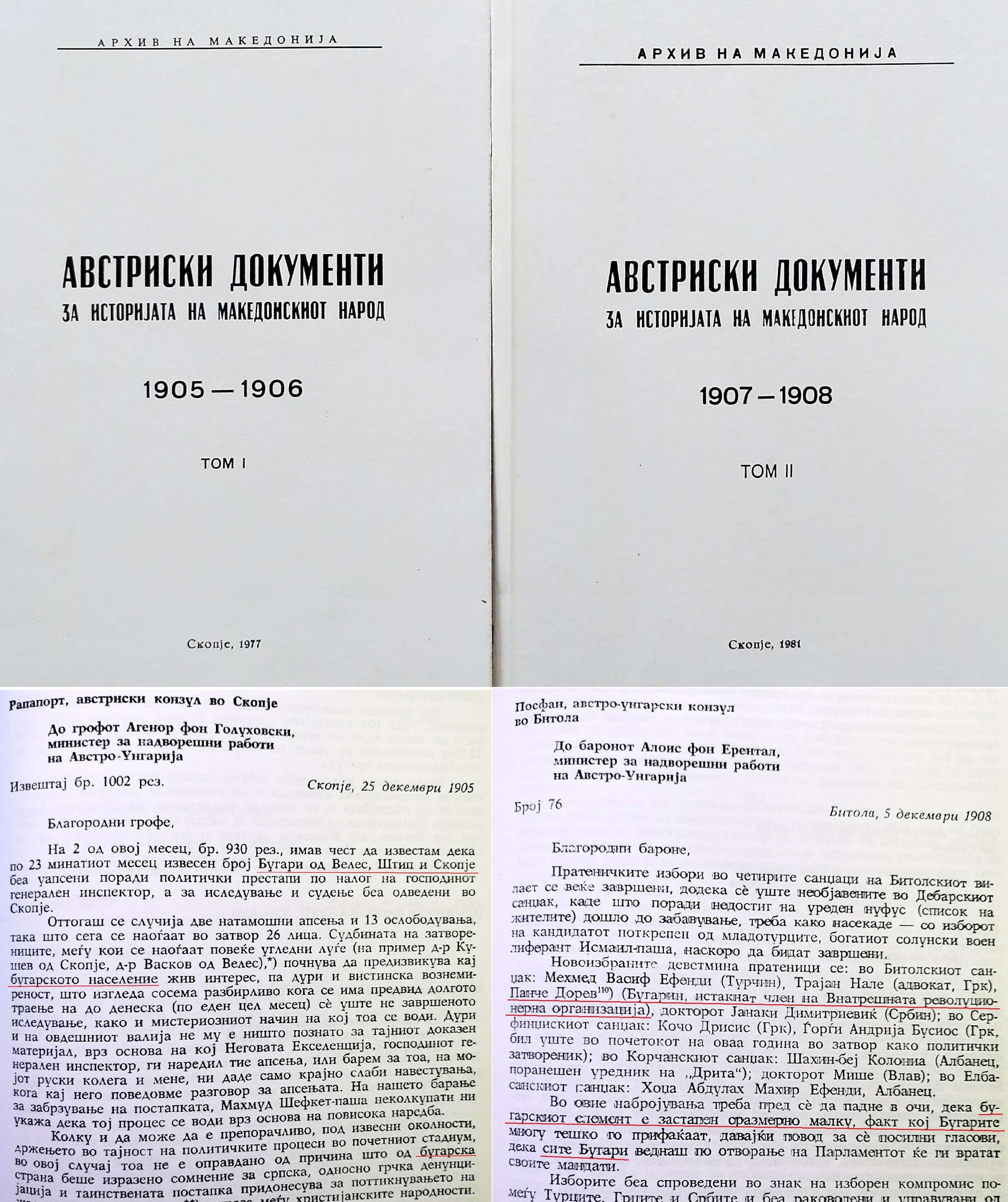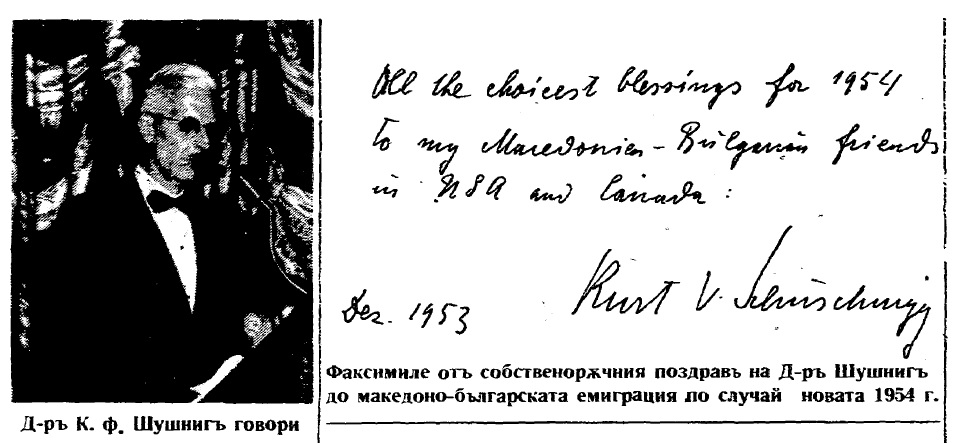site.btaAssociation of the Descendants of Refugees and Migrants from the Territory of the Republic of North Macedonia and Friends: To Thomas Waitz


THOMAS WAITZ,
ЕP CHIEF RAPPORTEUR ON NORTH MACEDONIA
COPY TO:
ALL MEMBERS OF THE EUROPEAN PARLIAMENT
Dear Mr Waitz,
Our association was established by individuals from the group of over 400 thousand Bulgarian citizens, descendants of refugees or immigrants from the territory of today's Republic of North Macedonia, who in turn are part of about 1.3 million Bulgarian citizens who themselves declare their origin from the geographical area of Macedonia.
We decided to address you because the media in North Macedonia have been trumpeting for a week that you have made a commitment in an EP report to recognize the ‘Macedonian identity’ and the ‘Macedonian language’. Prime Minister Hristijan Mickoski claims that they will be mentioned at least 4 times, emphasizing that they are centuries-old. However, someone has gone too far and this mention in the project is 9 times, which is reminiscent of some propaganda principles from Europe's dark past.
Our surprise at your actions is great, considering that the framework agreement for North Macedonia's EU membership in 2022 is the result of a compromise already agreed and approved by the EU, and ratified by the parliaments of North Macedonia and Bulgaria and by the other 26 Member States. Since then, political issues touching the sovereignty of the official language of Skopje should not be on the agenda.
Of course, the media in North Macedonia are in the ‘Macedonian language’, which according to you is Macedonian. This is not entirely true. This official language is North Macedonian and has nothing to do with the population in the other parts of the geographical area of Macedonia, located in Greece, Bulgaria and Albania. We draw your attention to the fact that, with the exception of the artificially inserted Serbianisms into the North Macedonian language, we understand everything else, i.e. about 95 percent of it. When necessary, we use this language in our correspondence, but we do not consider ourselves bilingual. Austrian scholar Otto Kronsteiner once called this language local Bulgarian, written on a Serbian typewriter.
We have no idea why you undertook to ensure recognition of the Macedonian identity and the ‘Macedonian language’. Identities and languages are not subject to recognition by international law. You probably made the commitment because you were told by the authorities in Skopje that Bulgaria denied the Macedonian identity and the ‘Macedonian language;.
Here we must make several important clarifications that must be taken into account when voting on the report.
At the first place, until 1944, except in the Communist and Serbian projects, there was no data on the existence of a Macedonian identity and language. In all population censuses in the Ottoman Empire until 1912, the majority of its inhabitants were registered as Bulgarians, while at the same time there was not a single ethnic Macedonian. According to the Ottoman authorities, this population was recognized as part of the Bulgarian people (in Turkish ‘Bulgar millet’). We have digitized copies of all Ottoman censuses of the population (in Turkish ‘Salnameler’) of the geographical area of Macedonia, issued in Ottoman-Turkish. If necessary, we can provide them to you. We would be happy if the EP or another European institution would finance their translation into a modern language.
Our association supported the publication of the Macedonia in European Ethnic Cartography Atlas, compiled by Ivan Ilchev, Member of Bulgarian Academy of Sciences, containing over 80 ethnographic maps of prominent European researchers, which reflect the presence of Bulgarians, but not ethnic Macedonians. We have read all the documents of the Austrian consuls from 1905 to 1908, published in Skopje in 1977 and 1981. They tell everywhere only of Bulgarians in Macedonia, but not of any Macedonian identity. The publication of these documents does not mean that there is democracy in North Macedonia. On the contrary, the publishers have announced that the Austrian diplomats made a ‘mistake’. We would therefore be grateful if you could show us and the Members of the European Parliament any Austro-Hungarian or Austrian documents that establish the existence of ethnic Macedonians before 1944.
Secondly, the documents clearly show that the Macedonian identity and the ‘Macedonian language’ began to be created in Tito’s Yugoslavia after 1944, and until 1948 and with some interruption until 1956, the Communist authorities in Bulgaria supported this process. However, in present-day North Macedonia, a completely independent movement emerged from the VMRO, which denied the Macedonian identity and language and sought to preserve the Bulgarian identity and the common literary Bulgarian language. There are hundreds of documents available that we can present to you. This example clearly shows that this is not a bilateral dispute between Sofia and Skopje (Belgrade), but a deep internal Macedonian conflict that has not ended even today. This conflict needs national reconciliation, not encouragement of the aggressor and continued destruction of the victim!
Thirdly, this same Macedonian liberation movement, which after 1944 fought to preserve the Bulgarian identity, supported those Austrians who after 1945 opposed the innovative term ‘language of instruction’ (Unterrichtssprache),introduced by the Ministers of Education Ernst Fischer and Felix Hurdes, and declared that this was German or, in the most remote case, the Austrian variant of the German language. We can also show you these documents so that you can see what solidarity means, which you are trying to punish today!
In 1953, a deep friendship and cooperation was built between the Macedonian liberation movement and the former Austrian Chancellor Kurt von Schuschnigg, and he was invited to visit and be the main speaker before the legal Macedonian liberation movement. In Detroit and Toronto, he gave talks to thousands of Macedonian Bulgarians. Von Schuschnigg emphasized the fact that until the First World War, the population of Macedonia was universally regarded as Bulgarian. Regarding modern times, he tried to draw parallels between Austria and Macedonia. He apologized to the audience that he would not speak in ‘your own Bulgarian language, but in English, a Missouri dialect with an Austrian accent.’ Of particular importance was the observation that the Macedonian question continued to exist, that ‘it has remained alive in the minds of people even to this day.’ According to him, the situation in Macedonia since 1913, repeated in 1919 and 1945, ‘does not offer a final satisfactory answer.’ Then he also made a written dedication: ‘Best wishes for 1954 to my Macedonian-Bulgarian friends in the USA and Canada. December 1953. According to the authorities in Skopje, which you support, there are no Macedonian Bulgarians!
Of course, the situation in Macedonia and Austria is not identical. In Austria, the term ‘Austrian language’ was never introduced, unlike in present-day North Macedonia, where the official ‘Macedonian language’ was created from the local Bulgarian dialects.
Although Austria pursued a policy of distancing itself from German identity and creating a separate Austrian identity, there was no physical violence in this transition. In 1956, 46 percent of Austrians still identified themselves as Germans. In 1964, this percentage dropped to 15 percent, but in 1990 21 percent of Austrians identified themselves as Germans. Today, no one declares Austrian Germans traitors or a minority, as the authorities in Skopje do with the local Bulgarians. No one emphasizes or insists that two identities – Austrian and German, be recognized in Austria today and be opposed to each other.
Unfortunately, the Communist regime in Belgrade and Skopje took a different path. Retroactively, all the Revival Period activists and revolutionaries who explicitly emphasized that they were Bulgarians and spoke Bulgarian language, were declared Macedonians and to speak some Macedonian language, the existence of which they did not even know. A bloody terror was imposed on the Macedonian Bulgarians. This policy is a direct continuation of the Serbian policy of 1913. After the present-day territory of North Macedonia was taken, the persecution of our ancestors began. There, 761 Bulgarian churches with 833 priests were closed, as well as 641 Bulgarian schools with 1013 teachers. In total, in the geographical area of Macedonia, over 1300 Bulgarian churches with 73 Bulgarian monasteries, 7 Bulgarian bishops and 1310 Bulgarian priests were closed after 1913, as well as 1370 Bulgarian schools with 2266 teachers. Bulgarian teachers and priests, who in their vast majority were local people, were expelled or killed.
There are numerous documents about the genocide against Bulgarians in present-day North Macedonia from 1944 to the present day. The latest massive example is the violence and manipulation during the 2021 North Macedonia census, where 20,000 people had their identities changed, and another 100,000 were not visited by census takers. Even at the beginning of 2025, three trials are being held there simultaneously against Ljubcho Georgievski, Dragi Karov and Dimche Yamandiyev, just because they identify themselves as Bulgarians in social networks.
At the fourth place, no one in Bulgaria denies the modern Macedonian identity and the right of its speakers to call their language Macedonian or North Macedonian. However, if the EP report recognizes only this identity and only this name of the language, our human right to have a Bulgarian identity and to continue calling our language Bulgarian is being taken away. It is like recognizing only the Austrian identity in Austria and taking away the right of those with German identity to express it and forbidding them to call their language German. Because that is exactly what the authorities in North Macedonia are doing!
In conclusion, we would like to underline that by creating artificial obstacles, this and previous governments of North Macedonia aim to block EU enlargement, thus serving not North-Macedonian but Serbian and Russian goals in the Balkans. We appeal to the MEPs to consider what would be the consequences if such an unreformed North Macedonia becomes a member of the EU!
For this reason, we insist:
1. That no centuries-old Macedonian identity be recognized. Such an identity was created only after 1944, and obviously this process does not proceed equally among all citizens of North Macedonia.
2. If a Macedonian identity in North Macedonia is to be recognized, the preservation of the centuries-old Bulgarian identity among a part of the population of this country must be recognized in parallel. The bearers of this Bulgarian identity must have the same rights as the other citizens of North Macedonia.
3. If the official ‘Macedonian language’ is to be recognized, it should be reflected in the declaration that the bearers of Bulgarian identity in North Macedonia continue to call the local dialects Bulgarian.
If this is not done, you deny science and you will violate our human rights to self-determination. By introducing an artificially created problem, you will strengthen Euroscepticism and ultimately make the EU weaker, not stronger. It is precisely at this difficult moment that Europe least needs this!
Respectfully,
Association of Descendants of Refugees and Migrants from the Territory of North Macedonia and Friends:
CO-CHAIRMEN: Prof. Trendafil Mitev; Assoc. Prof. Spas Tashev; Iliya Stoyanovski
SECRETARY: Dimitar M. Dimitrov
This presentation is also supported by the New Political Emigration of Macedonian Bulgarians, represented by Blagoy Shatorov and Goran Serafimov.
Sofia,
June 2, 2025
APPENDICES:

Austrian documents on Macedonia from 1905 to 1908, published in Skopje in 1977 and 1981. They all mention Bulgarians in Macedonia and nowhere mention the presence of ethnic Macedonians.

New Year's Message of the Former Austrian Chancellor Kurt von Schuschnigg to the Macedonian Bulgarians for 1954

Excerpts from the speeches in 1953 of the Former Austrian Chancellor Kurt von Schuschnigg to the Bulgarians in Macedonia.
Information about the violation of the human rights of Bulgarians in present-day North Macedonia between the two world wars and from 1944 to the present:
Ammende, E. Die Nationalitaten in den Staaten Europas - Mazedonien (1931)
/АЧМ/
news.modal.header
news.modal.text